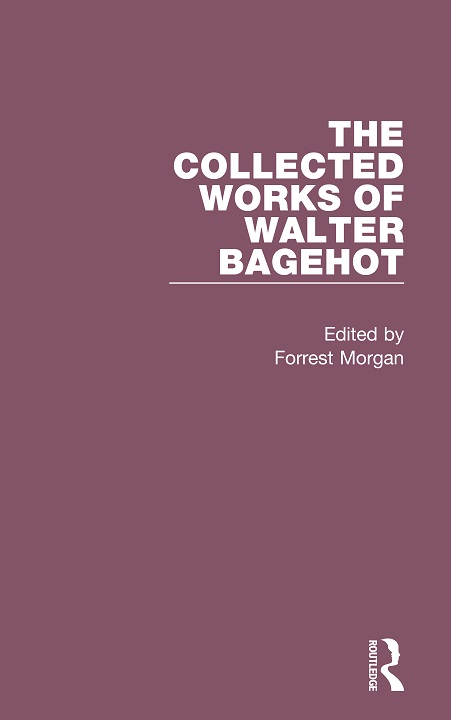Access to the full content is only available to members of institutions that have purchased access. If you belong to such an institution, please log in or find out more about how to order.
Loading content
We were unable to load the content

The Collected Works of Walter Bagehot
- Edited by
- Forrest Morgan
- Published: 1995
- DOI: 10.4324/9780415131544
- Set ISBN: 9780415131544
Walter Bagehot (1826-1877), the notable Victorian journalist, economist, and historian, was a prolific author of both books and magazine articles. Along with Matthew Arnold he was one of the most lucid and discerning critics of that time. He contributed to many journal articles, notably to the Prospective and National Reviews and The Economist, with a lively and witty style.
Widely considered to be a great authority on banking and finance, Bagehot was consulted by Chancellors of the Exchequer of both parties. His outlook, although never hostile to the working classes or trade unions, was openly sympathetic to the capitalist employers - a group that had never before such a brilliant spokesman.
His most enduring publications, The English Constitution and Lombard Street are both republished here, as are his Letters on the French Coup D'Etat, Literary Studies, and Physics and Politics.
Set Contents
Memoir., Second Memoir, Extracts from Article on “Oxford”, List of Alterations., Literary StudiesThe First Edinburgh Reviewers * (1855.), Hartley Coleridge * (1852.), Percy Bysshe Shelley. *, Béranger. *, Mr. Clough’s poems * (1862.), Wordsworth, Tennyson, and Browning; or Pure, Ornate, and Grotesque art in English Poetry. *, Shakespeare—The Man * ., John Milton. *, Lady Mary Wortley Montagu. *, William Cowper. * (1855.), Appendix (Translations)
Literary studies.: Edward Gibbon. * (1856.), Thomas Babington Macaulay * (1856.), Bishop Butler * (1854.), Sterne and Thackeray. * (1864.), The Waverley Novels. * (1858.), Charles Dickens. * (1858.), Henry Crabb Robinson. *, Religious and Metaphysical Essays.: The Ignorance of Man * (1862.), On The Emotion of Conviction. (1871.), The Metaphysical Basis of Toleration. (1874.), The Public Worship Regulation Bill * (1874.), Letters on the French Coup D’état of 1851.: Letter I, Letter II, Letter III, Letter IV, Letter V, Letter VI, Letter VII, A Later Judgment.
Biographical Studies.The Character of Sir Robert Peel *, Lord Brougham. * (1857.), Mr. Gladstone. * (1860.), William Pitt * (1861.), Bolingbroke As A Statesman. * (1863.), Sir George Cornewall Lewis * (1863.), The Tribute at Hereford to Sir G. C Lewis. (1864.), Adam Smith As a Person. (1876.), Lord Althorp and The Reform Act Of 1832. * (1876.), Memoir of Right Hon. James Wilson. * (1860.), The Prince Consort. (1861.), What Lord Lyndhurst really Was (1863), Mr. Cobden. (1865.), Lord Palmerston. (1865.), The Earl of Clarendon. (1870.), Mr. Lowe as Chancellor of the Exchequer. (1871.), M. Guizot. (1874.), Professor Cairnes. (1875.), Mr. Disraeli as a Member of the House of Commons. (1876.)
The English Constitution.: Introduction to the Second Edition., The Cabinet., The Monarchy., The Monarchy (continued)., The House of Lords., The House of Commons *, On Changes of Ministry., Its Supposed Checks and Balances., The Prerequisites Of Cabinet Government, And The Peculiar Form Which They Have Assumed In England., Its History, and the Effects of that History.—Conclusion., Parliamentary Reform *, The History of the Unreformed Parliament, and its Lessons. *, Physics and Politics.The Preliminary Age., The Use of Conflict., Nation-Making., Nation-Making.— Continued., The Age of Discussion., Verifiable Progress Politically Considered.
Lombard Street.: Introductory., A General View of Lombard Street., How Lombard Street Came to Exist, and why it Assumed its Present Form., The Position of the Chancellor of the Exchequer in the Money Market., The Mode in Which the Value of Money is Settled in Lombard Street., Why Lombard Street is Often Very Dull and Sometimes Extremely Excited., A More Exact Account of the Mode in Which the Bank of England Has Discharged Its Duty of Retaining a Good Bank Reserve, and of Administering it Effectually., The Government of the Bank of England., The Joint-Stock Banks., The Private Banks., The Bill-Brokers., The Principles which Should Regulate the Amount of the Banking Reserve to Be Kept By the Bank of England., Conclusion., Appendix., Economic Studies.: Prefatory Note., The Postulates of English Political Economy.: The Postulates..., —The Transferability of Labor., —The Transferability of Capital., The Preliminaries of Political Economy. *, Adam Smith and our Modern Economy., Malthus., Ricardo., The Late Mr Mill. *, The Growth of Capital., Cost of Production., Appendix., International Coinage.: The Alleged and the Real Advantages of an International Coinage., The Real Advantage of an International Measure of Account., The Conditions which an International Coinage Should Satisfy, and the Reasons why no Existing Coinage Fulfills them., The Practical Proposals for an International Coinage., The Practical Proposals for an International Coinage., The Result of the International-Coinage Discussion., The real Feasibility of Assimilating the English and the American Currencies., Some Articles on the Depreciation of Silver, and on Topics Connected with it.Prelims, The Low Value of Silver and Its Effect on India., The Remedies for the Fall in Silver., Further Suggestions on the Fall in Silver., The Effects of the Resumption of Specie Payments in France on the Price of Silver., The Effect of a Depreciation of Silver on our Foreign, and Especially on our Eastern Trade., The Extreme Fall in Silver, and the Hasty Remedies Proposed., The Report of the Committee on the Depreciation of Silver., The Proposal of the Bengal Chamber of Commerce to Suspend the Coinage of Silver In India., The Debate on the Indian Budget., The Different Effect on Trade of a Cheapening of the Precious Metals, and of a Depreciation of Inconvertible Paper., The American Commission on the Currency., The Permanent Effect The Result of theof an Increase of “Council Bills” on the Flow of Silver to India and upon the Indian Exchanges., The Effect of the “Council Bills” on the Indian Exchanges., The Minute of the Indian Government on the Depreciation of Silver., A Proposed Remedy for the Depreciation of the Silver Coinage of India., The Transition State of the Silver Market., Bimetallism., Appendix.